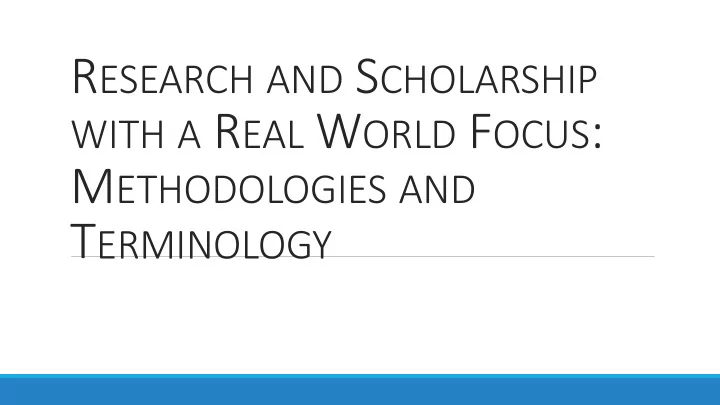

R ESEARCH AND S CHOLARSHIP WITH A R EAL W ORLD F OCUS : M ETHODOLOGIES AND T ERMINOLOGY
Agenda ▪ Introduction ▪ Why conduct empirical research in dispute resolution? ▪ Goals of empirical research ▪ Input to the ABA Dispute Resolution Section’s Dispute Resolution Research Advisory Committee ▪ How do you conduct empirical research in dispute resolution? ▪ Overview of methodology (Russell) ▪ Using the Mediation Research Task Force’s report to illustrate (Roselle) ▪ The practitioner’s perspective on the report and mediation research needs (Howard) ▪ The nuts-and-bolts of developing and conducting an empirical research project (Donna) ▪ Q&A ▪ Adjourn
ABA Dispute Resolution Section’s Dispute Resolution Research Advisory Committee ▪ Overall charge ▪ Bring science to the delivery of conflict prevention and dispute resolution services. Place the Section at the intersection of practice knowledge and know how. ▪ Ultimately assist with the development and sharing of cutting edge information that will strengthen the Section’s members, their practices, the profession as a whole, and the people it serves. ▪ More specific charges ▪ Disseminate the results of the Mediation Research Task Force’s Report. ▪ Encourage qualitative and quantitative empirical research regarding dispute resolution and the cooperation of Section members in such research. ▪ Convene meetings of researchers and sophisticated practitioners to move this research agenda forward — e.g., identify research needs, develop common definitions, and share research findings. ▪ Facilitate the presentation and use of research findings in all of the Section conferences, institutes, webinars, publications, etc. and the broad dissemination of research findings to the field.
ABA Dispute Resolution Section’s Dispute Resolution Research Advisory Committee ▪ Overall charge ▪ Bring science to the delivery of conflict prevention and dispute resolution services. Place the Section at the intersection of practice knowledge and know how. ▪ Ultimately assist with the development and sharing of cutting edge information that will strengthen the Section’s members, their practices, the profession as a whole, and the people it serves. ▪ More specific charges ▪ Disseminate the results of the Mediation Research Task Force’s Report. ▪ Encourage qualitative and quantitative empirical research regarding dispute resolution and the cooperation of Section members in such research. ▪ Convene meetings of researchers and sophisticated practitioners to move this research agenda forward — e.g., identify research needs, develop common definitions, and share research findings. ▪ Facilitate the presentation and use of research findings in all of the Section conferences, institutes, webinars, publications, etc. and the broad dissemination of research findings to the field.
Recommend
More recommend